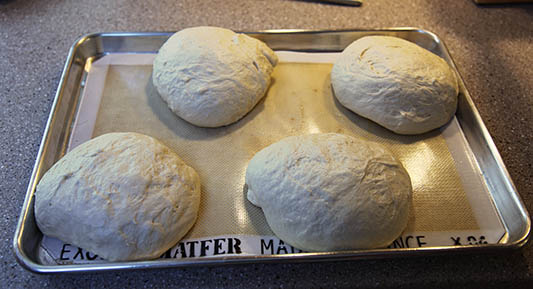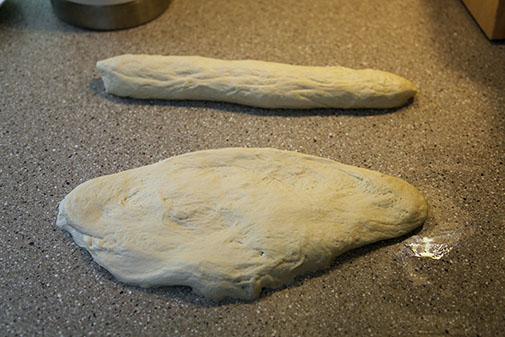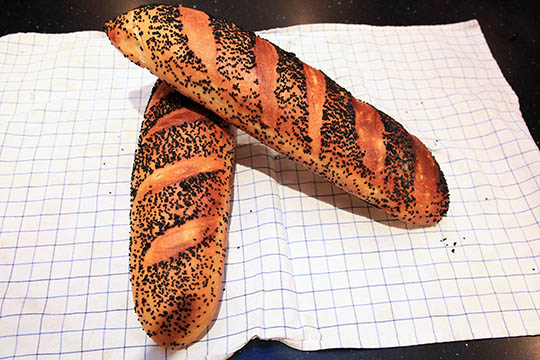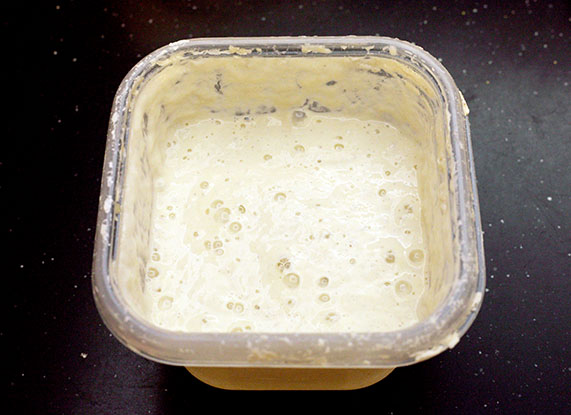INGREDIENTS:
- 1300 gram of unbleached Bread flour*
- 700 grams (~3 cups)
of bottled or filtered look warm water (no chlorine!!)
- 1.5
tablespoons of sea salt
- 300 grams of starter
- 0.5 cup of Black seeds** for
topping (Optional)
(****This mix of ingredients yields a 65% hydration dough)
PREPARATION:
Once the bread is risen take it out of the oven (remove the water pan too),
and preheat the oven to 500f.
Wet the bread with the water sprayer and place it on the middle rack, try to
minimize the time that the oven door is open so you don't lose too much
heat..
After 4 minutes open the oven, spray the bread (and the inside of the oven)
with water, and close the door as soon as you can.
* Flour - I use "Gold
Medal - better for bread - unbleached unbromated" flour
found in most supermarkets
IIn
a large
bowl (mixer
bowl or by hand) the sourdough
starter with the water until the starter is fully dissolved.
Add 400
grams of flour and mix well until smooth. Cover the bowl
and let stand in room temperature for 8 hours (over night). I like
to put it in the over with only the oven light on for a little warmth. This
stage is called "making a sponge". When you uncover the sponge, it should be
bubbly and frothy and smell like sourdough with a hint of alcohol.
Add salt and the remainder of the flour. Mix until most of the flour has
gotten wet, cover and let stand for 20 min or so. This will allow the flour
to absorb the water and the dough will become easier to handle.
Knead
the dough for 5 minutes until it is less sticky, smooth and uniform, and can
be formed into a ball. Lets stand for 5 minutes and knead some more. By now
the dough will be smoother and less sticky.
Split the dough into 4
equal parts (I use a scale) and form into 4 balls. Place on slightly oiled
baking sheet and let is rise for an hour (I put it in the oven with the oven
light on which makes it 80f or so) . To prevent the dough from drying
out and developing a skin I also put a baking pan with a few cups of warm
water in the over to make the oven humid. After a couple of hours, the dough
will raise to almost double its original size.

Take the dough out and shape it into 4 loaves of whichever shape you
like (I like loaves), and place them on baking sheets or special bread
forms.

use a sprayer/spritzer ($1 at Costco) with clean water to keep the
bread from dying out and forming a a hard skin. sprinkle black seeds on top
of the bread (spruse a sprayer/spritzer ($1 at Costco) with clean water to keep the
bread from dying out and forming a a hard skin. sprinkle black seeds on top
of the bread (spraying the bread with a bit of water will help the seeds
stick).

Place the bread into the middle rack of the oven with the light on. Place a
small pan with hot water on the bottom rack. This will help warm up the oven
to promote rising and also humidify so the dough doesn't dry.. On dry summer
days remember to spray the oven lightly with water..
Remember what
the bread looks like when it went in, because you need to let it triple in
volume. Depending of temperature and the four types, it would take from 3 to
5 hours.

When the bread starts
showing signs of browning (little gold patches, typically after 10-15
minutes of baking) turn the temperature down to 430f (if you have
convection, switch to convection at 410f).

It is very tempting to eat the bread warm, but sourdough tastes a lot
better after 2 hours..
As I said at the introduction, this process
looks long and complicated but the actual time that it takes is less then an
hour over 24 hours..
TIPS:
when you make the sponge you can make the bread more (or less) sour by
playing with the temperature. Cooler temperature (65f) promotes the bacteria
the makes it sour, and warmer temperature makes it less sour but faster
fermentation. If you choose to use lower temperature, you may need to add
4-5 hours to the fermentation time..
If you want to add another
flavor dimension to the bread, add 2 tablespoons of brewers malt*** to the
final dough mixture. You will not taste the malt in the final product but
the bacteria LOVE that stuff and the flavor is amazing. If you have some
coarse sea salt, you can sprinkle some on top of the bread before baking.
NOTES:
** Black seeds have no American name.
Latin: Nigella
sativa or
Ketzah (Hebrew), in Middle Eastern store you can find it under the name
Black Cumin or Black Caraway seed. In Indian stores it is called Black Onion
seeds or Kolongi
*** Brewer Malt (A.K.A
DME, Dryed Malt Extract) is a type of sugar that is extracted from Malted
Barley and can be bought at beer brewing supply stores
http://morebeer.com/search?search=DME
-----------------
-----------
-----
--
Sourdough bread, like a car, starts with a "starter" which is made of flour,
water and some luck. You need to make a starter only once, and in theory, it
could last for hundreds of years.
You can order dry
sourdough starter on-line and follow the directions on the package
(recommended).
http://goo.gl/Ob9tq
To make your own starter: Take a shallow dish
with large surface area, mix 100 grams of flour* and
200 grams of filtered/bottled water (no chlorine!) and mix well until
smooth. Place the shallow dish uncovered next to a window where fresh air
flows and wait. Make sure to mix it well whenever you have a chance (a
couple of times a day or more).
If you were good and did not angry the Gods
(have the right bugs floating in the air), you will get the good bugs to
"infect" the dough.
Sourdough is made by a yeast and a bacteria
that live symbiotically in the dough. The yeast makes CO2 and Alcohol, and
the bacteria (Lactobacillus
sanfranciscensis)
makes the acid/vinegar which gives the sourdough that tangy taste. You need
to do this only once! Once you achieved a good culture you can propagate it
for years, and in theory, forever..
This starter is made of equal parts (by weight) of water and flour, also
known as 100% hydration starter,
Remember to "feed" the starter every week. a couple of tablespoon of flour
and water, mix, and itís good for another week..
